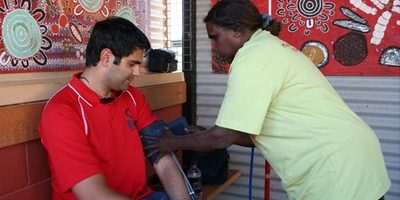
To have, to hold, to care: the Kanyini Vascular Collaboration
Today, National Close the Gap Day, is about recognising that Aboriginal and Torres Strait Islander peoples face some of the most challenging health circumstances in Australia, and taking action to change this.
Approximately one in five Australians suffer from chronic diseases like heart disease, kidney disease and diabetes, and for Aboriginal and Torres Strait Islanders people, these diseases occur more often and at younger ages.
Chronic diseases account for approximately 80% of the 12 year life expectancy gap between indigenous and non-indigenous Australians.
The reasons for this gap are multiple and complex; however, social disadvantage through unbalanced social determinants is a key contributor and such risk factors need to continue to be a focus for political reform and intervention.
The George Institute for Global Health focuses on community-led research programs that aim to address the physical, social, emotional and cultural wellbeing of Aboriginal and Torres Strait Islander Peoples and their Communities.
The Kanyini Vascular Collaboration
The Kanyini Vascular Collaboration – Kanyini meaning "to have, to hold, to care" – is a collaborative research program established by Aboriginal and Torres Strait Islander and non-Indigenous researchers, health professionals, policy-makers, people and communities to improve the management of chronic disease among Aboriginal and Torres Strait Islanders in primary care.
Established to effectively respond to the burden of chronic disease in Aboriginal and Torres Strait Islander communities, the Kanyini Vascular Collaboration has been a program of research at The George Institute for Global Health since 2006.
More recently, the collaboration has evolved to become a Centre of Research Excellence for Indigenous Primary Care Intervention Research in Chronic Disease.
The Centre is working to identify and overcome barriers to best practice chronic disease care for Aboriginal and Torres Strait Islander people in primary care settings.
Among its aims are improving health outcomes for Aboriginal and Torres Strait Islander people with or at risk of diabetes, heart and kidney diseases; and exploring and understanding health system enablers and barriers to care.
The Centre also aims to develop strategies to improve access, quality and safety of care; and to build the capacity of community and services to conduct high-quality research.
Examples of some of the projects being run by the Centre are:
- The Home-based Outreach chronic disease Management Exploratory: A study of a home-based, outreach model of chronic disease management for Aboriginal and Torres Strait Islander people with chronic disease, their families, and their primary health care service.
- Chronic Care Model: A study being conducted in collaboration with Aboriginal communities and primary health care practitioners to develop an appropriate model of care for Aboriginal and Torres Strait Islanders to improve quality of care, quality of life and outcomes of chronic disease.
- Depression and Chronic Disease study: A study of a free-to-use depression screening tool for use with Aboriginal and Torres Strait Islander people attending primary care services.
For more information visit the Kanyini Vascular Collaboration (KVC) website.


